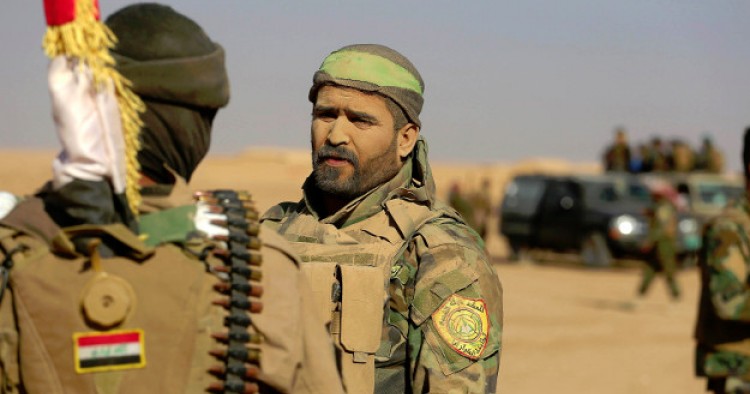The Iraqi Popular Mobilization Forces (P.M.F.) today liberated the historic city of al-Hadar in western Mosul from the Islamic State, the Iranian media reports. Iraqi security forces cooperated with the P.M.F. in al-Hadar offensive. According to Fars News Agency, which is affiliated with the Islamic Revolution Guards Corps (I.R.G.C.), P.M.F. forces began the “Muhammad Rasulullah” operations on Tuesday and have so far seized 12 villages in western Mosul from Islamic State militants. The Iraqi government yesterday claimed about 70 percent of western Mosul had been reclaimed from the Islamic State, and that they were moving forward slowly to the remaining areas to minimize civilian casualties. The P.M.F. has also begun a joint offensive with the Iraqi army to retake areas between the provinces of Diyala and Salahuddin.
Comment: The P.M.F.’s prominent role in military operations against the Islamic State – particularly in western Mosul – has recently soured ties between the Iraqi and Turkish governments. Anakara opposes P.M.F.’s participation in Mosul operations and has expressed the concern that sectarian Shiite P.M.F. units linked with Iran may engage in revenge killing against Sunni inhabitants of Mosul after the ouster of the Islamic State. Turkish President Recep Tayyip Erdogan recently called the P.M.F. a “terrorist organization” and criticized Iran’s “expansionist” policies in the region – drawing anger from the Iraqi government. Some P.M.F. commanders called on Baghdad to expel the Turkish ambassador.
The P.M.F. consists of militia forces largely from Shiite but also other Iraqi ethnic and religious groups. While some P.M.F. units are Iraqi nationalists and follow Iraq’s top cleric Grand Ayatollah Ali Sistani, many prominent groups within P.M.F. have close ties with Qassem Soleimani, the head of the IRGC’s elite Quds Force. What makes Iraqi Sunnis and regional Sunni governments particularly worried is that, despite P.M.F.’s diversity, it is the Iran-backed militia units within the P.M.F. – such as Asaib Ahl al-Haq, Kata’ib Hezbollah – that are playing the most prominent role in western Mosul.
Last November, Iraq’s parliament approved a law legalizing the P.M.F. as separate military corps – a decision some Sunni Iraqi politicians and lawmakers derided as a Shiite “dictatorship.” But while the P.M.F. is now an integral part of the Iraqi armed forces, some P.M.F. units still receive their guidance from Soleimani rather than the Iraqi government. Many P.M.F. units have also been accused of committing rights abuses – including war crimes such abductions, extrajudicial killings, torture and property destruction.
The Iran-supported groups’ leading role also poses security risks to the U.S. military advisers that are helping the Iraqi forces battling the Islamic State. Recently, Iran-linked Iraqi militia groups have launched a vicious propaganda campaign against the United States and the I.R.G.C.-affiliated media outlets have dutifully circulated their conspiracy theories.
The Middle East Institute (MEI) is an independent, non-partisan, non-for-profit, educational organization. It does not engage in advocacy and its scholars’ opinions are their own. MEI welcomes financial donations, but retains sole editorial control over its work and its publications reflect only the authors’ views. For a listing of MEI donors, please click here.












